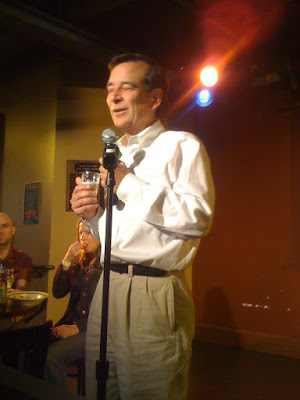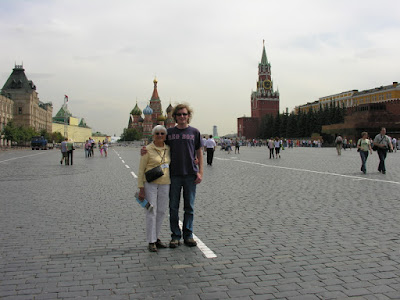As many of you know, I was confused as to how a boat might proceed from Moscow to St. Petersburg in a timely way, because no rivers really connect the two cities. Luckily, Peter the Great realized this to be a problem, and he began what ended up being a massive construction project to dig a canal from the Moscow River to the Volga. By the 1930s, the last of 18 locks was installed to make the route highly navigable. The locks are filthy cesspools that breed mosquitoes, so one must make sure to close one's cabin windows before bed every night.
Unsurprisingly, the damming of the Volga created some reservoirs. Judging by the number of "sunken churches" and other sunken things, the Soviets specifically targeted only interesting and beautiful towns (as most of the route is completely void of humanity). Here's the most famous sunken church, which we saw on our first full day of cruising:

Our first stop along the way was in the town of Uglich. Uglich has 35 churches for its small population, but, as I discovered, only one of them (the one the tourguides take you to) would avoid being condemned as unsafe in a more civilized country. Pictured below is my Russian "friend" (it was not easy to communicate with her, but she represented the best of a bad situation) Ekatajarina in front of the second-best kept church in all of Uglich

Uglich has 40% unemployment, which might help explain why many of the overgrown dirt-lots were populated, at 10am, with middle aged men drinking vodka straight out of the bottle. "Kate," as we were encouraged to call her, did not think this particularly remarkable.
We next stopped in "Yaroslavl," where we saw more churches and stuff. 'Nuff said. Day 3 was spent "cruising," so I sat, alternately reading and rocking back and forth in my chair mumbling to myself, to pass the time. (NB: I almost lost it at the end of the trip when someone said that they hadn't had any time for reading on the entire trip, but then I decided that would not be a productive thing to do).
The most interesting stop on our cruise was an island whose name I don't remember. It is famous for its wooden churches. Pictured below is the Summer Church (too cold to use in the winter, too big to heat I guess), which was originally built without the use in construction of a single nail:

Here's another view, along with some of my boatmates. The dude in the foreground is so old he still uses a
film camera.

Next day we went to Mandrogi. Oh Mandrogi. How to even describe it. Perhaps the best thing to do is for you to Google this place for a few minutes. Most telling is that all of the signs, from the Vodka Museum to the Moose Farm, are written only in English. We did have mediocre Russian barbecue though - and it smelled
fantastic.
During the cruising portion of the trip, I read The Brothers Karamazzov (highly recommended), Thomas Pynchon's "V" (only recommended for those who practice flagellation), and Mark Twain's "Roughing It," which is classic. But honestly, I can't really read for more than 10 hours a day - so how did I spend the other empty hours of the day? I slept. I was in bed for like 16 hours a day basically.
Next, perhaps after my backpacking trip, you can look forward to Russia III: St. Petersburg, the final entry in this trilogy.




















